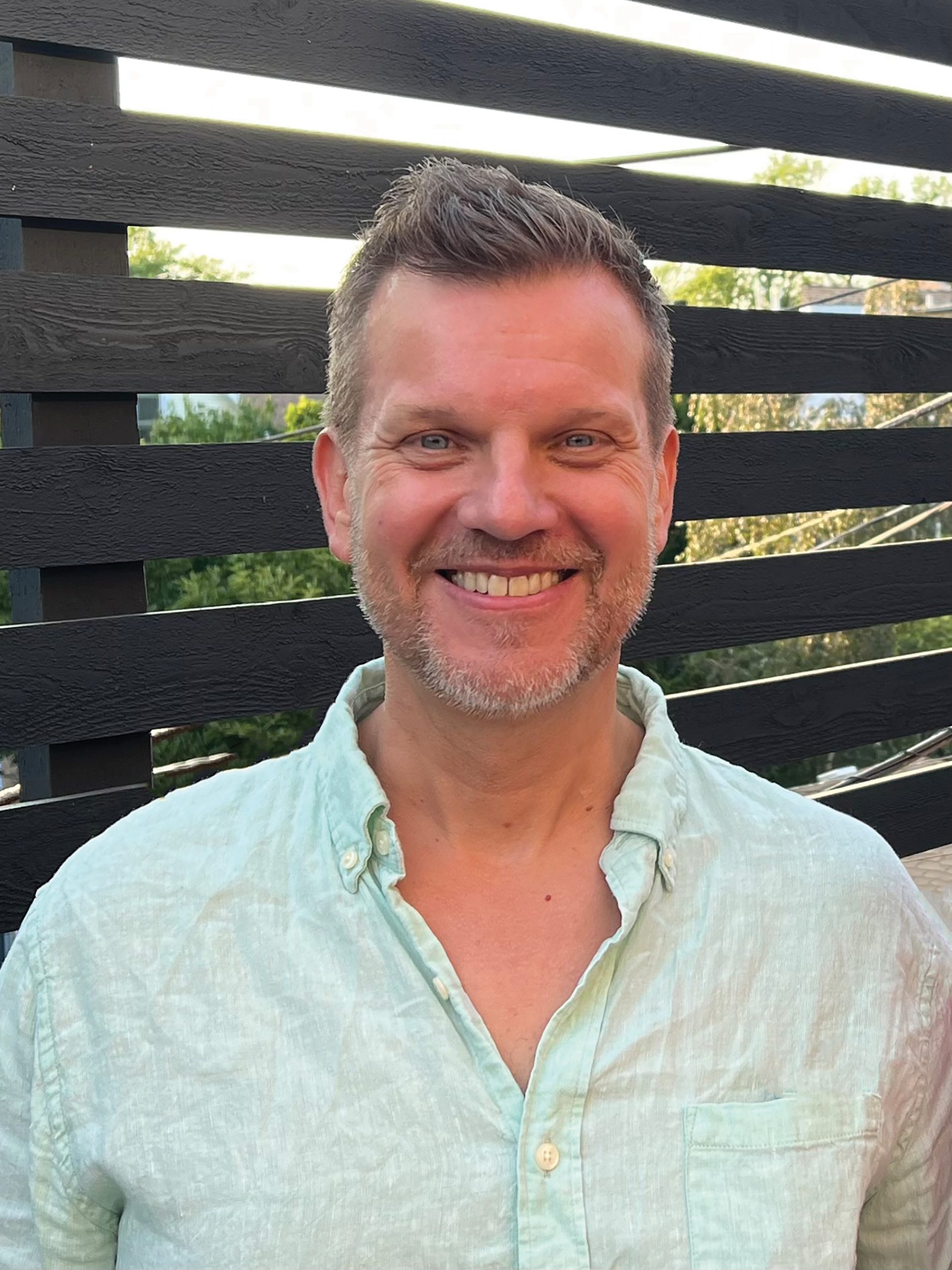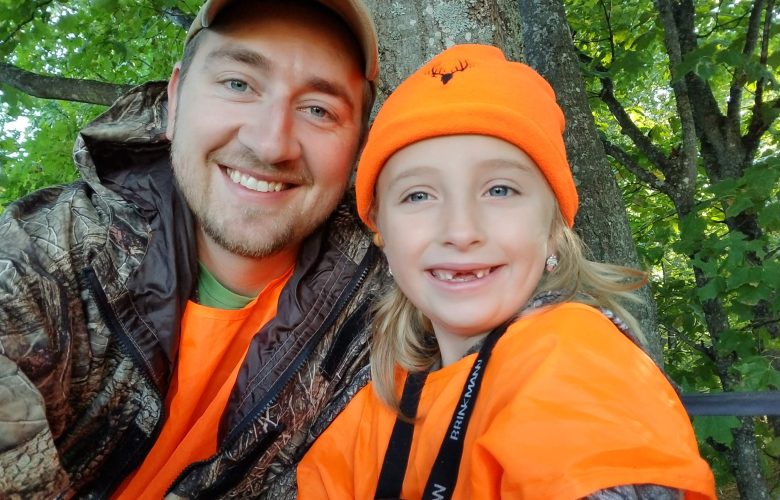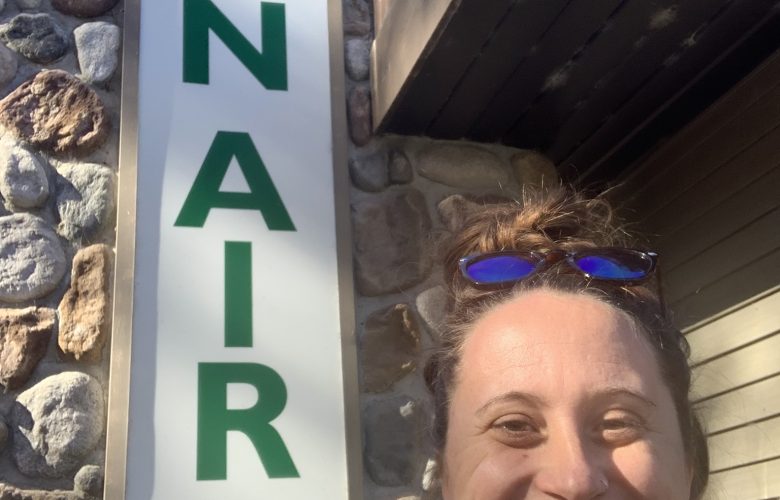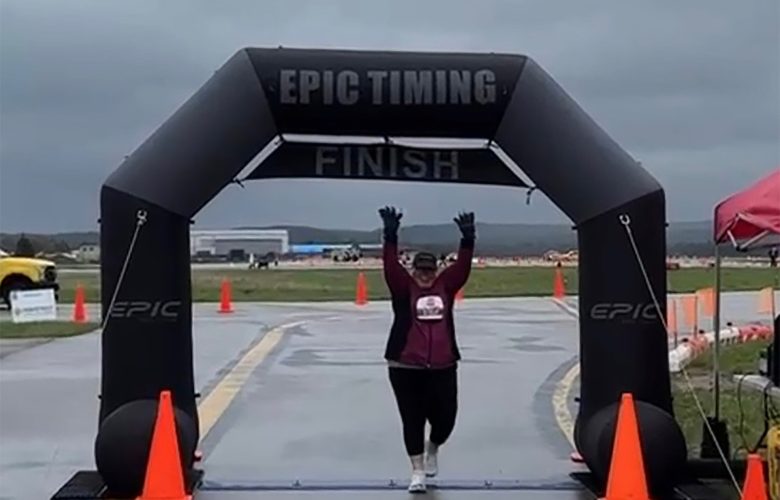Questions & Answers with community faces
Todd Bruce (54) was born and raised near the shores of Saginaw Bay in Huron County, before his family moved to Benzie County in 1988, when he was 18 years old. Bruce’s parents, Ted and Kathie, had decided to leave farming behind and were looking to buy Timberline Shell gas station in Benzonia.
At the time, Todd Bruce was halfway through his first year at Western Michigan University, and he felt a little indifferent about the family move, as he was on a different career/life path, planning to get his degree and move elsewhere. In January of 1988, Bruce’s father asked him if he wanted to take a ride “Up North” to look at the store they were thinking of buying. Bruce recalls that “from Cadillac to Benzonia, it was snowing so hard you couldn’t even see the roadway. We pulled into the parking lot at Timberline, walked in, I looked around and took it all in. We drove north to the corner where Stapleton’s is; the snow was coming down so hard that we just turned around and drove back home. I thought, ’They’re crazy, but if this is what they want, fine.’”
Spring arrived, and the Bruces moved up to take the store over in May—late May is an entirely different experience in Benzie County. Bruce and his father took over the store, with the elder Bruce working all day, and the younger Bruce taking the overnight shift. “It took about a week to get my bearings and adjust, and one night before my shift, I grabbed a local map and decided to drive to Frankfort and around Crystal Lake. It was about 8 p.m. and I came under the Gateway at the top of the hill. The sky was completely clear, the sun was coming down into a perfect sunset, and I had to pull to the side of the road to take it all in. I literally thought, ‘My God, we’ve moved to paradise.’”
In the coming years, Bruce would help at his parents’ store in the summer and spend fall and winter continuing his studies at Western Michigan University in Kalamazoo. A combination of his father giving him an ultimatum, and his friend’s father, Dennis Campbell, who developed Harbor Lights motel and condominiums in Frankfort, commenting one time to Bruce that what Frankfort really needed was a great pizzeria.
At that time, Pete Sandman was running the Frankfort-Elberta Area Chamber of Commerce at 334 Main Street, but in conversations, Sandman agreed to move the Chamber if Bruce would provide younger people with jobs in the community—which he did.
So, two months later, on June 26, 1993, Papano’s Pizza opened its doors. Now, 30 years later, Papano’s has five locations around Northern Michigan; all are owned and operated by friends and former employees of Bruce, and are integral parts of the communities they serve.
Continuing with our interview series on impactful Benzie County characters, The Betsie Current caught up with Bruce as he was working on menu updates, as well as configuring the new cross-company gift card program.
The Betsie Current: What made you want to be a business owner? And why specifically pizza?
Todd Bruce: Great question. I cannot remember a time in my life when I did not want to be a business owner. If we took a look at my entire life, going back to when I was eight years old, I had an entrepreneurial spirit. My parents bought a lawnmower around that time and “volunteered me” for several lawnmowing jobs around the block; I am pretty sure they did this because they wanted to keep me occupied with something constructive to do in the summer. I loved the relationships with the customers, and of course, what kid doesn’t love some revenue, right? Earning my own money, a sense of independence. My dad and I were a great team; I would mow lawns during the day, and he would go trim them at night, when he got home from work. Believe me when I tell you that was more about quality control than anything! But, I mean, if there was a way to earn money working for myself, I would hustle—lemonade stands along streets being paved during hot summers, paper routes, selling anything to anyone. I just enjoyed commerce, but I especially enjoyed being able to control the aspects of it: quality, service, price, etc. Fast forward to me being in business school at a university, sitting in a class thinking that most of university business education prepares you to be a great cog in a business machine. I remember sitting between two guys named Rick; I looked to my left and said, “Rick, what are you planning to do with your degree?” And he said, “I want to get a job working for Kellogg’s and work my way up the corporate ladder.” I looked to my right and said, “What about you, Rick?” And his response was, “Yeah, that’s pretty much what I want to do, too.” It was that ‘aha’ moment of, OK, wow, not everyone wants to be in business for themselves?! It is just what I always wanted to do. I would be remiss if I didn’t say that I learned some extremely important things in business school in terms of economics, accounting, and finance, in particular. A lot of entrepreneurs dismiss or misunderstand the importance of formal business education, but I am here to tell you how important those skills are to long-term success. More directly though, my dad called me up on the phone during my last semester and announced that I was “getting kind of expensive” and that I “wouldn’t be able to work for anyone else anyway,” so he felt it was a good idea if I found a business I might be interested in and that he and my mom would try to help me to get it going. I have often said that my dad was my greatest enabler, and he was; he and my mom both believed in me and my skills more than I did at that time. Anyway, I made some comment about, “Well, I have always thought the pizza business is great,” and about seven or eight months later, I opened my first pizzeria. My mother would probably love to tell you one of her favorite stories about how I used to make pizzas and a huge mess in her kitchen every weekend; true stories. I went to the library and found recipes, wrote them down, and would come home and mix dough, season sauce, grate mozzarella cheese from blocks, bake them. I loved pizza. I still love pizza, all kinds, and I likely still eat more than I should! My poor family had to eat crappy homemade pizza for years. Sorry! But honestly, at the time I got in the business, I was 23, and I figured I would do it until I was 30 and then figure out what I wanted to do with my life—here we are 30 years or so later. Perhaps I should consider my second act now?
Current: Explain to our readers about how many Papano’s Pizza stores there are, and how that works.
Bruce: We have five locations now. I opened the first store in Frankfort in 1993 with the help of my brother, Kirk (48); Beulah followed in 1996; Emden, Germany, in 1997. In 1998, my sister, Kalee, passed and that event really made me take a step back and assess my life; I sold the Frankfort location to my brother, Kirk, and the Beulah location to Andy Miller, both of whom still own their stores. I took a good year off to re-evaluate my life. In 1999, I opened the Interlochen location with the intention of selling it to a manager and bringing in Jeff Yacks as another partner with Andy Miller. In 2000, I bought property adjacent to Crystal Mountain in Thompsonville for a pizzeria but ended up also building a convenience store and gas station to complement it; it just made sense, given my history at my parents’ Timberline store in Benzonia. Alex Moreno is a partner in Thompsonville. Yacks and Miller subsequently opened a store in Kingsley a couple years later. A few years ago, we reshuffled things a bit and brought in a couple other managers as partners in the stores, so we added Randy Wright and Alex Moreno as owners in Interlochen; Yacks is exclusive in Kingsley. The key is we have experienced, invested owner/operators in each location. To be fair, full disclosure, most of my day now is dedicated to the convenience store/gas station business, as it is the largest part of my operation, and I have a couple of other silent partnerships I work with. But that is really because the group of people involved in owning and operating Papano’s Pizza stores are really great, talented people who know what they are doing, who have decades of experience, and I learn a lot from them. But yes, every ship needs a captain; it is my brand, and I need to steer the ship to protect the brand, quality, and reputation, for everyone’s sake. While a lot of the local focus and my identity has been tied to Papano’s—and I am very proud of what we’ve done and the ways we are involved with and support our community—my greatest source of pride is that I have enabled five different individuals/couples with the pride of ownership of their own business, and to make an honest living in such a great place as Northern Michigan. They have achieved their success on their own, with hard work and risk-taking, but I was glad to be a catalyst on that journey.
Current: Wait, wait, wait, there is a Papano’s in Germany?!
Bruce: We call it “American Pizza Pan” in Emden, Germany, but yes. I remained friends with Thorsten, a student I met here in Benzie County in 1988 who was here on a cultural exchange, and over the years, we visited back and forth. I took a vacation to Germany in 1996, and we decided to give it a go in Germany. Or he did; I just didn’t say no. We opened the doors in Emden on July 26, 1997, on the four-year anniversary of the original Papano’s in Frankfort. My former business partners—Thorsten, his wife, Pam, and their two daughters—continue to operate there to this day. That entire experience of opening in a foreign country was instructive and created some hysterical lost-in-translation moments, so I’m happy we decided to do that.
Current: Where did the name Papano’s come from?
Bruce: This question makes me laugh a little, because we had a very talented customer who writes for other Northern Michigan publications craft a fanciful tale about this once upon a time. Truthfully, long story short, it’s a portmanteau of “Papa Knows Pizza.” I thought it would be funny to make it like a last name, just to see how many people would come in to tell me they “know the Papano family,” so it became Papano’s Pizza. Sure enough, the first summer we were open, a group of three guys from Detroit stumbled out of Baker’s Bar—which is now Dinghy’s—and came down to the store because that actually was the guy’s last name. He was so excited. I had to give him a shirt.
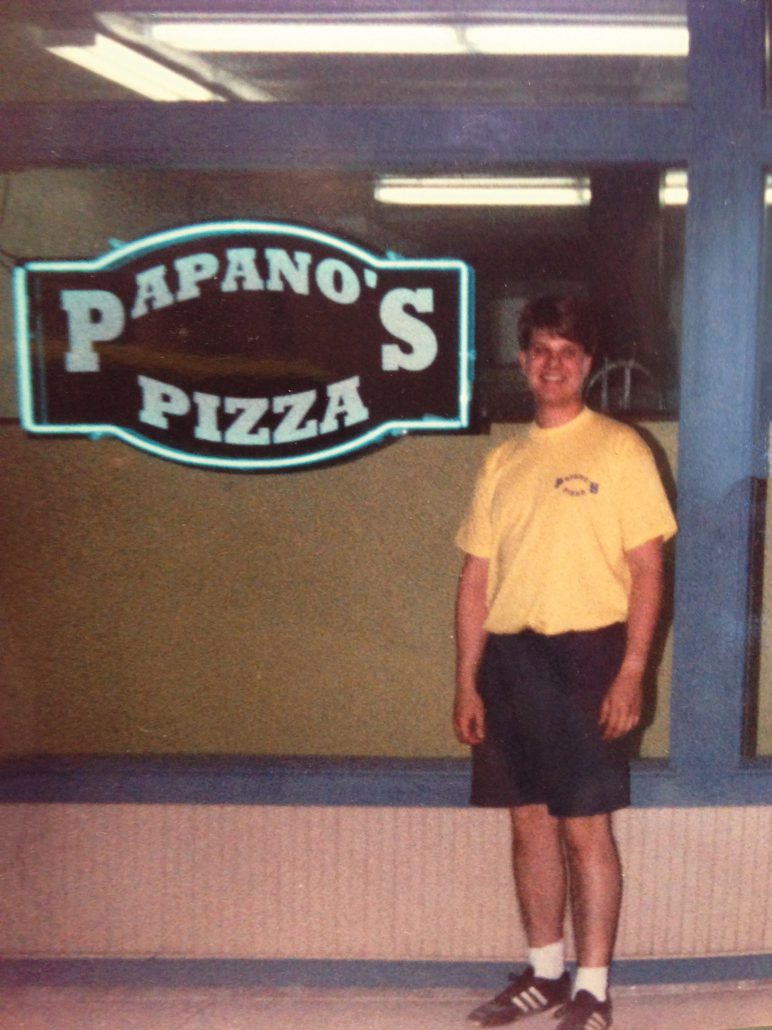
Current: What are your top three best sellers? What are your three favorite items on the menu?
Bruce: The Deluxe, Works, and the simple Pepperoni pizza are consistently our top sellers. My favorites, hmmm—I love a simple Cheese or a Cheese-and-Pepperoni pizza, with garlic, sesame, and butter crust. To truly judge a great pizza, I always order one with just cheese or with cheese and pepperoni. That tells me everything about a company’s commitment to quality ingredients and flavors. Then I’m torn between a Buddha pizza on thin crust, a Little Vincent sub, but I mix it up constantly. I’ve been eating a lot more vegetarian combinations lately. Fresh tomatoes, marinated artichoke hearts, mmm.
Current: What does a typical day of work look like for you?
Bruce: All of my work now seems to be all of the things that make a successful business, but no one ever really sees: managing relationships, particularly with vendors, advocating for all of the stores and trying to use our group leverage to negotiate favorable contracts, looking at trends in food, testing different options for ingredients, menu costing, labor analysis, sales trends, marketing campaign success or failure, returns on investments, looking at equipment and technological improvements that might help us, and taking a close look at the feedback we receive. I can certainly still go in and make pizzas, but my perfectionism and rigidness can make me hard to work alongside! That said, if I’m in a store, my favorite job in the kitchen, oddly, is washing dishes. You start out with a pile of dishes, you clean them, you see an end result. Nothing I do has a definite end or result anymore; it’s adjusting, shifting, accommodating, finessing on a continuous basis. Interestingly, I can walk into just about any of our stores and there is a 90 percent chance an employee won’t know who I am, due to the anonymity of my work now. This is good and bad—good because it gives me an opportunity to directly observe how our employees interact with our guests and perform their work, but bad because I don’t want them to think I am unapproachable or disinterested in their ideas or feelings about products, services, etc., because out of everyone in our operation, they know the business and customers the best.
Current: How have you seen your work grow and change? How do you hope that it will continue to grow? What is next?
Bruce: In the early days of the company, it was all very exciting. I didn’t really have anything to lose, and I rarely said “no” to an opportunity. Open another store in Beulah? Sure. Open in Interlochen? No problem. Open a store in Germany? I am definitely in! Hey, I bought this piece of property adjacent to Crystal Mountain to open a pizzeria, but you know what I think would be better? A gas station with a convenience store and pizzeria. I have always, always gotten a charge out of the planning, design, specing, building out, and promoting of a new concept. I get 100 percent energy back from what I put into that. A couple of life events in my late 20s/early 30s slammed the brakes on that phase of my life and moved me into the maintenance phase of business operation. I am pretty good at that part of the business, but personally I don’t find it challenging or fulfilling. Lucky for me, a lot of people do find that part of it rewarding! In many ways, I feel like I have reached a crossroads—I quietly tried retirement for about three months earlier this year and nearly went out of my mind. I was grateful for the preview of what that might look like, and I think I resolved what that might look like for me eventually. So what next? I have given a lot of thought to expansion; we certainly have all of the systems and tools in place to successfully duplicate what we do elsewhere, and I am not afraid to make investments for that to happen. However, in the course of 30 years, I have only had four people in the company come to me and ask me about store ownership, and they all own stores now. Nobody else has displayed that ambition or taken the initiative. From experience and observation of business failures, I know that one of the worst things you can do is put someone into a position of responsibility who doesn’t truly want it and seek it out, and so that has been a limiting factor. I can teach someone the skills, but I can’t teach them the passion, and I am completely OK with that! I also have a slight aversion to working with people who want to come in from outside the company. Understanding our mission and wanting to be a part of it is a lot more important to me than someone who likes our pizza and thinks, “Oh, I would like to own a Papano’s Pizza store, how do I do that?” I am not ruling that path out, and I have a few opportunities for that kind of growth, but Papano’s is like my child… To that end, I have been spending a lot of time thinking about what we do, how we do it, and how we can do it better. What is better? What does better look like? To me, growth doesn’t necessarily mean more dollars in revenue; it can mean taking what we do and doing more of the same and doing it better. How can we create a better customer experience, what changes can we make to cater to changing palates? If you asked the guys in the company, I have tended to be a little too far ahead of the curve sometimes. Funny story: I pushed to introduce paninis in our stores in 1999. But 95 percent of our customers couldn’t pronounce “panini” back then, nor did they know what one was. Those who tried them loved them. But I still have some very high-quality, expensive panini makers in our equipment storage, or maybe I should call it a hoard? Hoarders, Pizza Guys’ Edition, haha. Or that Thai Chicken pizza we offered in 1997? Man, it was good, but just not enough demand then; ahead of its time. I have been spending a lot of time working on doughs, different flours, hydrations, different yeasts, fermentation periods, sauces and seasonings, different cheeses. I think people would be astonished to know how many different mozzarella cheeses there are and how differently they bake, melt, stretch, and taste. We are capable of doing many things differently than we do now, but it’s excruciatingly difficult to balance continuing to do what we do, as we do it, to satisfy our customers’ expectations, with the challenge of introducing new concepts, products, and methods across a team of more than 100 people, promoting that change, and focusing on the execution to make sure it is done perfectly. In some ways, maybe it would be easier to open a low-volume, passion-project pizza workshop without regard to making it commercially viable, but that can also be a heartbreaking exercise, too, and we still have a company to run. Risk/reward and all that. I was eating some Indian food last night thinking about what a veggie samosa pizza topped with a tamarind chutney on a paneer kulcha crust would look like, and I got really excited—then checked myself and laughed at myself for a few minutes. I guarantee you it would be amazing and probably should be on a menu, just maybe not our menu, not yet. It is difficult to make specialty things for 20 people who might enjoy it without a lot of food waste. But I do see the opportunity to continue to refine, reinvent, and improve our products and our customers’ experiences. To me, that is more important than “growth” just for the sake of growth. I have never sought out growth that didn’t happen organically, by choice.
Current: What kinds of things do you do for fun, when you are not working? What other things are you involved with? How did you get involved with them, and why are you passionate about these causes?
Bruce: If there is one thing I have been an abject failure at in my life, it is “fun things outside of work.” A friend once told me, “Your job isn’t who you are, it is just what you do.” To an extent, that is true, and I generally recommend people look at their lives in a universal sense and not get too wound up about the little things and their career, in general, balanced with my belief that, when you do something, you should give it absolutely 100 percent effort to doing it well. Most of my pleasures come from a bit of feral existence. I have never been good at being content in one place at one time. I like to explore, meet new people, exchange ideas, see new things and places. I need and seek constant mental stimulation—to my own frustration, and undoubtedly to the frustration of many conversation partners. Lately, I have been involved with the Frankfort Area Community Land Trust, and can I say, what an amazing team of humans these people are! I am certain I wear them out with my questions, but it has been a real pleasure to see that we helped to create housing in our community for people who are contributing to our local workforce, those who were previously shut out of the local housing market. Housing insecurity is a hugely misunderstood problem in our community, and it is really complicated, some real three-dimensional chess, and I guarantee you it is going to get worse, not better. Additionally, I am doing a little work behind the scenes on some healthcare initiatives, in terms of options and accessibility. Food insecurity for younger people in our communities weighs on me heavily, and I have approached a couple of groups with ideas on how to move the needle on this, but I think my intentions were misunderstood or I may have been perceived to be stepping on toes, which was not my intention at all. I can’t undertake these issues on my own, not enough time or bandwidth; I can only offer support and some direction, so I am looking for opportunities there. I will say that I really do believe in “teaching a man to fish,” in addition to just giving him a fish to feed him. I do a lot more consulting than I ever thought I would, and I am always happy to lend a hand. Someone keeps trying to get me to join SCORE [Service Corps of Retired Executives, business mentoring], but I resent that that feels like I’ve been “put out to pasture.” If we can’t pass knowledge along, though, what is the point of having it? I spend a lot of time contemplating what I can do today that my future self would be proud of. I am, perhaps, a bit of a strange capitalist? Make no mistake, I am a capitalist, but I feel a tremendous social responsibility. “To whom much is given, much is expected,” and all that. To that end, I spend a lot of time thinking about my roots, ancestors, the things they did to create opportunities and to build a foundation for me to succeed. I believe deeply in this country, because having spent time developing businesses in Europe, it really called my attention to our ability to move up the economic ladder that we enjoy here; not that it is easy, but at least it is possible. In my humble opinion, when we are at our best, we are a country of optimists, rooting for each others’ successes and being given the space to enjoy our own. When we are at our worst, we look backward with a defeatist attitude, pining for the way we perceived things used to be, “better times” that objectively weren’t necessarily better. We really need to be lifting each other up, but we also need to be focused on being better at what we do and contribute. Life isn’t just a zero-sum game—you don’t always directly get back what you put in—but when you give, everyone benefits. So my passion comes from the naive belief that maybe somehow I can move the needle on social welfare somehow. I should probably be more honest with myself about my abilities and impact! But do one small thing, create ripples in the ocean… or do what you can with what you have where you are, or something like that.
Current: How have you seen Benzie County/Northern Michigan change since you grew up here? What are your hopes for the area in the future?
Bruce: Funny enough, I did not grow up here. I grew up in a small farming community of about 1,600 people in the thumb of Michigan. Moving here after my first year of college, at age 18, taught me that, in small towns, what people want—their hopes, dreams, fears, etc.—translate just about anywhere in the world. However, having spent the better part of 36 years here, I am a local now, right? Benzie County is home. Over the course of the past 36 years, I would say that, as much as things have changed, they are very much the same in many ways, or at least I see the pattern here is similar to what the entire country is experiencing: a wide and growing division between haves and have-nots; an aging population; parents struggling to juggle work, childcare, education; loss of local businesses that sustain variety and quality of life replaced by “efficient, big-box or online stores and chains”; more financial strains, due to subscription models, market concentration, and inflationary pressures. You know, most people don’t want a tremendous amount in life: having a job that gives them financial security, good healthy family and friends, a social connection, being able to raise kids who manage to stay out of trouble, have something to aspire to, and repeat that cycle, right? To that end, I would love to see this area create an environment where we can foster the happiness and success of our current residents and create opportunities for people to make a decent living, afford a suitable home, and never worry about food on the table. There are a lot of things that make Benzie County appealing from the natural sense, and we need to protect those things, but we also need to be able to look at what we can do to balance that equation to make opportunities possible. I was in a zoning meeting one time when a zoning advisor said, “You know the definition of a preservationist is a guy who already owns a house on the top of the hill.” A healthy community has multiple generations and a cross-section of different cultures and experiences. I would like to see us mindfully work toward these goals, but I realize my vision may not be widely shared.
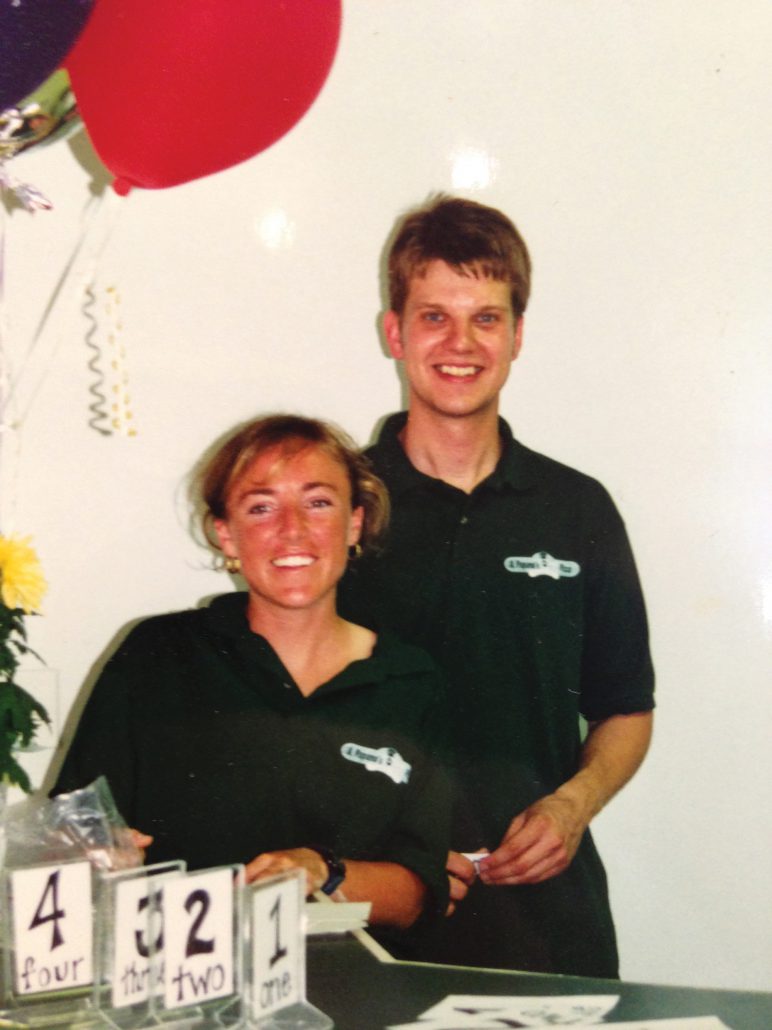
Current: What are the biggest challenges and rewards of living/working in Northern Michigan, in general? What is the best or most rewarding part of your job?
Bruce: Biggest rewards: community, far and away the greatest reward. Time and again, this community shines a light on how good people can be to one another and in supporting one another, in good and bad times. The honesty and earnestness of most people in the local business community. Also nature: if nature is a cure for everything that ails you, we should never suffer a day of distress. Biggest challenges: distances. Time is a precious commodity, and I am impatient by nature, so having to travel distances to accomplish things—meetings, appointments, shopping, etc.—drives me a little crazy. The lack of quantity and quality of advanced healthcare options; this is really a numbers game, so I understand it. We are, even in Traverse City, considered “rural,” and to that end, it can be taxing and difficult for people to get the care they need locally, and traveling for it is a huge time and cost burden. I learned the hard way during a hospital stay two years ago the limits of our local system. It is through no fault of the providers in the area; we simply don’t have the numbers to justify advanced care. But it is worth noting that, even two hours away in Grand Rapids, the options aren’t a world better; our best options are nearly four hours away in Ann Arbor or Detroit.
Current: What could Northern Michigan do to attract more and/or retain talented people in this area? What else does Northern Michigan need?
Bruce: Northern Michigan needs more and better pizza options! In terms of attracting/retaining talent, we have to take a look in the mirror and ask ourselves what attracted us to be here, what made us stay, and then figure out how to foster an environment to allow more people to see themselves living in and enjoying those same things. So much of any success is being able to not rest on laurels, to take a good honest look in the mirror and recognize our own weaknesses of failing points. If we can’t be honest with ourselves, we can’t improve. Talent attracts talent, success attracts success, but before we even get to a point where we are attracting people, we need to focus on building the foundation to allow people to succeed. The market can’t solve all problems and won’t, by itself, foster growth. We need to not only remove obstacles but also incentivize people when we can. “We have a great school system,” compared to which ones? Successful and talented people are going to want to be able to network with one another and for their children to have great cultural and educational opportunities. We need to accept that we can’t save our way into growth; we need to invest in infrastructure—housing for our workforce, secure senior living near to grocery and healthcare, public water and sewer treatment, high-speed internet access, perhaps a couple of co-working spaces that people can drop into to get out of working from the home and to exchange ideas, and more businesses and services whose business models allow them to be open all year. I think it would be great to have a county-focused vision on all of these things. I am sometimes alarmed at how we can be all working toward a common goal, but oftentimes people let ego and pride get in the way of obtaining a better outcome for everyone.
Current: What are your favorite local events and activities? Any favorite dining, recreation, hiking spots?
Bruce: OK, so I’m a bit of a hermit to be honest, haha, and my dog makes that existence a lot less lonely! I am the guy who will look for 100 reasons to not attend an event but then show up and won’t be able to leave, because he’s having such a great time talking to people. Favorite dining out spots: The Manitou, The Roadhouse, Vita Bella, and the reason I choose them is because of their owners and staff. They take the time to know their guests, old and new, acknowledge them, take a minute to joke around with them, or engage them in conversation. We live in a small community, and those relationships matter! For carry out, or an alcohol-free dine-in experience, I mean, did I mention I eat a lot of Papano’s Pizza? So a perfect day for me would be spending the morning with the doggo, a hike around Old Indian Trail avoiding ticks, floating the afternoon away on Crystal Lake near the outlet, maybe a couple boats with friends nearby, convening later at a friend’s house for carry-out or burning a couple of steaks on the grill and a great ice cream cone with a two-mile walk home to work the day off! Or I have been known to throw my bike rack on the car, load up the bike, drive up to some small town in Leelanau County and ride around every side street, stopping somewhere for a bite to eat, and making conversations with whomever is sitting nearby. I do need to get out more, I really do!
Current: What does your perfect winter day look like in Benzie County? How would you spend it?
Bruce: Contrary to my grumbling about winter, I actually do enjoy it. I like it to be cold, and I like to have a nice covering of snow. Most of my complaints are gray days that aren’t cold enough to really get out and enjoy winter activities, or when we don’t have snow. I enjoy solitude in the National Park by cross-country skiing or snowshoeing. Probably coming home hungry and cooking a big meal from scratch that will have enough leftovers for a few days. I am starting to, hopefully, work my way down my bucket list this winter, and I plan to spend a few weeks in the Alps in February—taking in fresh mountain air, eating copious amounts of rib-sticking food, skiing, reading, etc. And if I have any luck, I’ll spend spring in Paris to work on my language skills a bit; everyone should learn to speak pâte à choux, éclair, and the art of dramatic public arguments, where it was all invented. But, my heart will be here, and if history is telling, I will get bored after about a week and come back to watch those spectacular Lake Michigan winter sunsets.
Papano’s Pizza has five locations: Beulah, Frankfort, Interlochen, Kingsley, and Thompsonville, plus Emden, Germany. Learn more at Papanos.com online.
Featured Photo Caption: Todd Bruce (54) was born and raised near the shores of Saginaw Bay in Huron County, before his family moved to Benzie County in 1988, when he was 18 years old and had just finished his first year of business school at Western Michigan University. Fast-forward five years to 1993, when Bruce opened the first Papano’s Pizza store, of which there are now five, three decades later. Photo courtesy of Todd Bruce.

